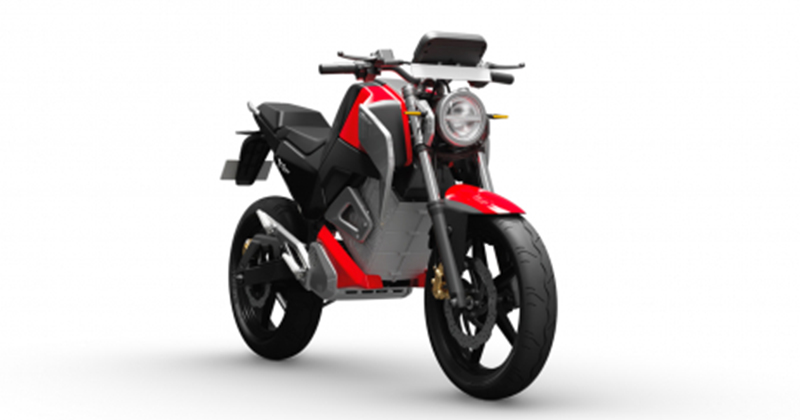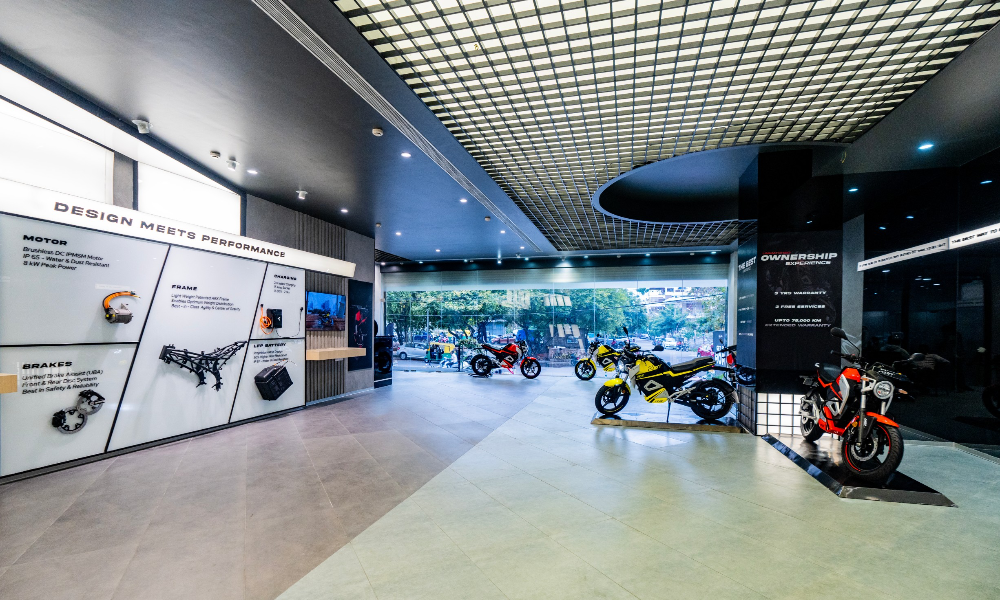- ALL
- TRENDING
- PERFORMANCE
- CHARGING
- BATTERY
- DESIGN
- TECH
- NEWS
Market Trends and Consumer Adoption of EV Motorcycles

Table of Contents
- Market Trends for EV Motorcycles
- Consumer Preferences
- Factors Driving the Adoption of Electric Motorcycles
- What are the Insights of Charging Infrastructure for Electric Bikes in India?
- What Consumer Trends are Impacting Demand for Higher-End EVs?
- Factors Affecting Adoption of EVs for Mass-Market Consumers
- Conclusion
Witness the exciting shift towards sustainable transportation with electric motorcycles. Our analysis demystifies the changes in EV market trends and explores the reason behind the increased adoption of electric motorcycles.
The way we move from point A to B has evolved over the centuries. At first, steam locomotives took over traditional carriages. In the next few decades, fuel-powered vehicles became the norm. Today, we are witnessing yet another transition – towards a sustainable future with EVs (electric vehicles). Owing to the eco-friendly and fuel-efficient nature of electric motorcycles, experts believe they are set to be the next big thing.
This shift is already in motion, with the global e-bike market expected to grow at 9.8% by 2032, reaching an impressive $44.08 billion. Key automobile players in the market are increasingly offering cost-effective e-bikes with cutting-edge technology and superior performance to boost consumer adoption.
But what does the current generation of consumers prefer? Are the market trends hinting at a drastic shift? Let's answer these burning questions by taking a deep dive into this electrifying trend.
Market Trends for EV Motorcycles
Investors and automobile giants are clearly and extremely bullish on the EV segment. With experts already betting on electric motorcycles as the future of transportation, top battery bike manufacturers are trying to get a head start into establishing themselves as leaders in this space.
The primary reason behind this optimism is the increased consumer interest in electric motorcycles. Two-wheelers account for almost 30% of the total number of vehicles worldwide. In India alone, bikes and scooters take up 75% of the entire vehicle count, indicating the massive demand for two-wheelers. To tap into this huge market, major players in the EV bike segment are constantly innovating.
Additionally, the government is also launching new campaigns and policies to boost the adoption of EVs. The switch from outdated public transport vehicles to new-gen EVs is already in motion nationwide. Furthermore, the government has introduced subsidies and tax benefits to encourage the adoption of electric motorcyclesacross mainstream mobility and public transportation.
Finally, more charging stations have been set up across the country, along with the introduction of battery swapping policy under the FAME (Faster Adoption and Manufacturing of Hybrid and Electric Vehicles) scheme. Such collaborative endeavours between the government and manufacturers are poised to drive substantial growth in EV sales in the years to come.
Consumer Preferences
The modern consumer is informed, environmentally-conscious, and tech-savvy. Here are some of their primary expectations of EV motorcycles:
- Performance
The early days of e-bikes engraved the notion that EVs are slower than traditional bikes. As a result, consumers expect the new generation of EV motorcycles to offer the same if not better performance and power as their ICE counterparts. Thankfully, brands like Oben Electric offer power-packed electric motorcycles, proving that EVs can provide top-notch performance.
- Cost-Efficiency
The initial purchase cost of EV motorcyclescan be slightly higher than standard motorbikes. However, a holistic comparison will reveal that e-bikes are much cheaper in the long run -- owing to their low operational costs and the government's price concessions.
The government provides FAME subsidy on EV purchases, slashing purchase costs by INR 15,000. Additionally, under the Income Tax Act section 80EEB, you can avail a tax deduction of INR 1.5 lakhs on the interest component of an e-vehicle loan. The final icing on the cake is that electric motorcycles are cheaper to maintain, making them an affordable choice.
- Environmental Impact
A primary concern among eco-conscious riders is the negative effects of their bike rides on the environment. With more riders seeking a thrilling yet guilt-free riding experience, EV motorcycles offer the perfect solution. Their zero-carbon emission and dependence on renewable energy make them ideal as a sustainable transport option.
- Smooth Riding Experience
The increased noise levels in urban areas have been a concern for many years. Conventional motorcycles are infamous for their loud engines and the accompanying zooming sounds.Thankfully, electric motorcycles have emerged as a more silent alternative. Equipped with fewer moving parts and a hushed motor, e-bikes ensure enjoyable rides while eliminating the unwelcome clamour of engine revving.
Factors Driving the Adoption of Electric Motorcycles
Several factors are propelling the adoption of EV motorcycles at full throttle:
Government Incentives
The government is incentivising the adoption of electric vehicles, including battery bikes. Launched in April 2019, the FAME 2 subsidy aims to promote electric motorcycles' adoption by reducing purchase costs. Under this subsidy scheme, two-wheeler owners can enjoy a price incentive of up to 15% of the value of their EV motorcycles.
Advancements in Battery Technology
One of the major concerns of EV owners in the early stages was its range. A lower range and longer charging time gave its users range anxiety and led to the misconception that EVs are not good for long distances. However, improved battery technology has addressed these concerns and increased the popularity of e-bikes.
Environmental Concerns
Issues related to climate change are constantly making the headlines. Consumers now want to make informed decisions and purchase eco-friendly products. For such eco-conscious customers, e-motorbikes have emerged as a great alternative to standard bikes. With zero carbon emissions and non-reliance on fossil fuels, EVs are gradually steering the change towards a sustainable and eco-friendly future.
Economic Factors
Rising fuel costs are also a leading concern besides the environmental scare. With the costs of petrol and diesel skyrocketing, consumers want an alternative source of energy that is easy on the wallet. This is where electric bikes make their grand entry. Owing to EVs’ reliance on cheap and renewable electric power, consumers can ride without being burdened by fuel prices.
What are the Insights of Charging Infrastructure for Electric Bikes in India?
India's growing urbanisation and increasing traffic congestion have led to a rising interest in electric bikes as a sustainable and convenient mode of transportation. As a result, there has been a growing need for a robust charging infrastructure to support the adoption of electric two-wheelers.
An accessible and well-distributed EV infrastructure is key to faster adoption of e-mobility. The existing EV charging infrastructure requires upgradation to facilitate quick and easy charging and eliminate range anxiety among EV users. According to research by the Bureau of Energy Efficiency, the number of EV fast charging stations in India should reach around 46,000 in the top 9 cities by 2030, while the number of charging stations in the country stands at a mere 5,234.
Given the need for faster infrastructure development, the government is encouraging small businesses, retailers, and RWAs to set up charging stations with various incentives and subsidy schemes. Many state governments offer land at subsidised rates to set up fast charging stations across the state. For instance, the Maharashtra government offers a subsidy of Rs. 5 lakhs for the first 500 to install a public charging station, while charging station owners can avail 100% SGST reimbursement for setting up public charging stations.
In addition, various private players have also been investing in setting up charging stations for electric vehicles, including electric bikes. Some of these top players include BESCOM, Indian Oil Corporation, and Ather Energy. Further, collaboration between electric bike manufacturers, energy companies, and government bodies can accelerate the development of charging infrastructure. Partnerships may involve sharing the cost of setting up stations, streamlining regulatory processes, and promoting a unified approach.
What Consumer Trends are Impacting Demand for Higher-End EVs?
Consumer sentiment towards sustainability concerns drives the desire for EVs; 75% of Indian consumers are looking to change (or have already changed) their consumption patterns based on sustainability concerns.
But that’s not all; numerous other consumer trends will contribute to a demand for higher-end EVs. These include-
1. Technology and Innovation
Consumers today are drawn to EVs that showcase innovation and state-of-the-art technology. Higher-end EVs incorporate the latest technological advancements, including advanced driver assistance systems (ADAS), powerful battery packs, advanced safety features, and cutting-edge infotainment systems.
2. EV Performance
Consumers are increasingly seeking higher-end EVs offering superior performance and extended range capabilities. Faster acceleration, top speeds, and longer driving ranges contribute to the appeal of premium electric vehicles. Brands like Oben Electric offer excellent performance with Rorr, which provides a quick acceleration of 0 to 40 km/hr in 3 seconds and a top speed of 100kmph.
3. Design
A significant portion of the market for higher-end EVs consists of consumers who prioritise style, and comfort with their e-bikes. Integration of high-quality materials, stylish framework, and innovative design attracts buyers seeking a premium driving experience.
4. Environmental Consciousness
With sustainability being a major concern and a driving force towards EV adoption, many consumers are even willing to pay a premium for electric bikes that align with their environmental values. Higher-end EVs marked by eco-friendly materials, energy-efficient components, and overall green manufacturing practices, can attract higher demand.
5. Brand Reputation
Trust in the brand is a significant factor influencing EV purchase decisions in the premium segment. Established automakers with a strong reputation for quality and reliability can leverage their brand image to attract consumers to their higher-end EV models. Oben Electric is a brand that packs in innovation, state-of-the-art technology, impressive design, and powerful performance for a quality driving experience.
6. Availability of Charging Infrastructure
The availability and accessibility of a robust charging infrastructure can impact the demand for higher-end EVs. Consumers may be more willing to invest in premium electric vehicles if they have confidence in the convenience and reliability of charging options.
Factors Affecting Adoption of EVs for Mass-Market Consumers
For the mass-market consumer, several factors affect their willingness to shift from traditional petrol-powered bikes to electric ones. Some of these factors are-
1. Price and Affordability
The upfront cost of electric vehicles is a significant factor for mass-market consumers. Affordability plays a crucial role in the adoption process, as electric bikes are known to be slightly costlier than their traditional counterparts. However, EVs have low operating and maintenance costs due to fewer moving parts, making them a cost-effective solution in the long run.
2. Government Incentives
Government incentives, tax credits, and subsidies can significantly impact the affordability of electric vehicles. Mass-market consumers may be more willing to adopt EVs with the availability of financial incentives that reduce the overall cost of purchase.
3. Range Anxiety
Concerns about the ride range of electric vehicles, often referred to as "range anxiety," can be a barrier to adoption. Mass-market consumers may hesitate to switch to EVs if they are unsure about the vehicle's ability to cover their daily commuting needs without frequent charging.
However, brands like Oben Electric can eliminate this range anxiety in Indian consumers with its Oben Rorr, which offers a range of 187 km on a single charge and a top speed of 100km/h.
4. Charging Infrastructure
The availability and accessibility of charging infrastructure are crucial for mass-market EV adoption. Consumers need confidence that they can conveniently charge their vehicles, whether at home, at work, or in public spaces, such as highways and petrol pumps. As a result, developing a robust charging network becomes essential for mass EV adoption.
5. Battery Technology and Performance
Battery technology and life are the backbone of high-performing electric vehicles. Inadequate battery performance can often lead to high operational and maintenance costs, long charging times, slow speed, and range anxiety, all of which can impact the mass adoption of EVs.
So, to make EVs more appealing to consumers, there is a need to improve battery technology and performance to ensure a smoother bike riding experience.
Conclusion
The market for EV motorcycles is brimming with potential. A positive change in consumer preference, powered by government incentives, is powering this transformation.
With changing consumer preferences and demographics, Oben Electric's standout model, the Oben Rorr, is poised to redefine the motorcycle landscape. Equipped with a 4.4kWh battery, 8kW peak performance motor, and cutting-edge app connectivity, the Oben Rorr is a roaring addition to India's arsenal of EV motorcycles. Visit our website to book your Rorr today!




